July 3, 2002: Notebook
Program to teach minority students about journalism
Jewish opinions differ on campus

Water wonder
When it comes to rivers and river basins, there are few more influential scholars in the world than Ignacio Rodriguez-Iturbe, who began teaching in his native Venezuela 35 years ago and eventually landed at MIT before arriving at Princeton in 1999. Some-times referred to as the father of ecohydrology, Rodriguez-Iturbe teaches in the Department of Civil and Environmental Engineering and the Princeton Environmental Institute, where he is acting director.
Rodriguez-Iturbe’s work recently earned him the 2002 Stockholm Water Prize, a $150,000 award known as the “Nobel Prize of water.” The Stockholm Water Foundation is honoring him for his scientific contributions to the understanding of the interaction between climate, soil and vegetation structures, surface water, and floods and droughts.
One of his major discoveries came in the 1990s, when Rodriguez-Iturbe and his collaborators established that despite the infinite variety of shapes and forms river basins take, they have a common structure in their two- and three-dimensional organization. He was also able to develop equations that predicted the drainage pattern that nature will produce under different climatic and geologic conditions.
He has used his knowledge to develop a unique undergraduate class, The Fractal Beauty of Landscapes, and he also teaches two of the country’s first undergraduate and graduate courses in ecohydrology, which involves the interaction of the atmosphere and hydrology with plants and soil.
“I love the geosciences, and I had studied engineering in Venezuela.
Hydrology is a perfect combination of the two,” he says. “I
love to try to explain what’s going on in nature.”
![]()
By A.D.

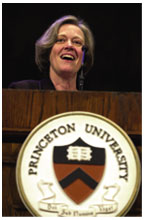

Photo: In her second annual open forum at Reunions, President Tilghman talked with alumni about a range of issues affecting the university. (Robert Sciarrino)
More than 500 alumni took a break from their Reunions revelry to sit down in Richardson Auditorium on June 1 and listen to President Tilghman as she covered her “very extraordinary rookie year” and answered questions from the audience.
Tilghman opened with prepared comments on what she’s learned during her first year in office, including deciphering the ins and outs of Princeton’s $801-million budget. “I used to think that quantum mechanics was the most complicated thing I had to learn,” she said.
She then focused on the continued success of Princeton’s student body, citing this year’s two Rhodes scholars and four Marshall scholars.
She also stressed the connection between recruiting quality students and bringing in and retaining quality faculty, including those whom alumni “have not read about on the cover of the New York Times,” a reference to the media frenzy surrounding the return of Cornel West *80 and the appointment of K. Anthony Appiah, both of whom are leaving Harvard for Princeton this fall. “I did not want to give you the impression that we only recruited two people this year,” joked Tilghman, who credited Provost Amy Gutmann with helping fight off the “many raids from lesser institutions” that targeted current Princeton professors.
With cement trucks and green fencing greeting alumni this year, Tilghman also addressed construction on campus. Starting on a positive note, she pointed out that two buildings opened their doors this year, the newly renovated Bobst Center for Peace and Justice and the Friend Center for Engineering Education.
One of the major upcoming projects she talked about was Whitman College, the university’s sixth residential college, which is scheduled to be ready for Princeton’s 500-student expansion in 2006.
When the floor opened up to questions, alumni asked Tilghman to cover topics that ranged from admissions and athletics to what issues most concern her.
At that question, Tilghman quickly turned the conversation to alcohol, but said that her administration has not uncovered evidence of any large-scale drug problem on campus. She said there is an informal ethos on campus of “work hard, play hard” that some students follow. “I think they see Thursday and Saturday night as a release of the pressure cooker,” Tilghman said. “We have to continue to work with students on releasing the pressure in ways that do not kill neurons.”
About admissions, Tilghman said Dean of Admission Fred Hargadon has the hardest job in the world, which this year included dealing with a swell in applications following the success of the Princeton-based film A Beautiful Mind. She also addressed the legacy issue. Legacies’ performances measure up to the Princeton student body as a whole, she said, adding that if a situation arose where it was a “coin toss” decision for Hargadon between two indistinguishable students, “Dean Fred will give the legacy an advantage.”
Tilghman said she plans to make her Conversation with the President
an annual Reunions event “until no one shows up.”
![]()
By A.D.

Photos from Princeton Communications
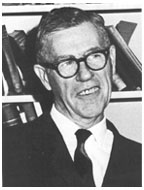 Samuel
Atkins ’31 *35, professor, emeritus, of classics, died of congestive
heart failure March 20 in California. He was 91.
Samuel
Atkins ’31 *35, professor, emeritus, of classics, died of congestive
heart failure March 20 in California. He was 91.
Atkins, a member of the faculty since 1937, served as chair of the classics department from 1961 to 1972. He transferred to emeritus status in 1978.
An expert in Vedic philology and Indo-European linguistics, his areas of interest included Hellenistic literature, Greek, and literary criticism of Greek and Latin texts. He also taught Sanskrit in the East Asian studies department.
Born in Madison, New Jersey, at Princeton Atkins was awarded the George Wood Legacy Prize, presented for academic excellence during the junior year. He earned his doctorate in Oriental studies.
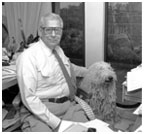 Marion
J. Levy, Jr., the Musgrave Professor of Sociology and International Affairs,
emeritus, died May 26 of complications from Parkinson’s disease.
He was 83.
Marion
J. Levy, Jr., the Musgrave Professor of Sociology and International Affairs,
emeritus, died May 26 of complications from Parkinson’s disease.
He was 83.
Levy was known for his scholarly contributions and his passionate involvement in academic issues. He often was seen in the company of the Komondor dogs he loved and bred, and a self-published book, Levy’s Laws of the Disillusionment of the True Liberal, became a classic often quoted far beyond Princeton.
Levy came to Princeton in 1947 after earning a doctorate in sociology from Harvard. In the 1950s, he became a central figure in efforts to make sociology scientific. During the 1960s, Levy was best known for his writing on modernization theory. Over his lifetime, Levy wrote or contributed to 15 books and published more than 100 articles and reviews.
Throughout his career at Princeton, and especially during the 1960s
and 1970s, he engaged in often vehement discussions about the role of
the university and higher education. Levy became an emeritus professor
in 1989. ![]()

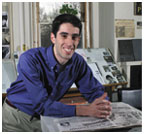 Program
to teach minority students about journalism
Program
to teach minority students about journalism
Photo:Richard Just ’01 (Ricardo Barros)
his summer, 20 alumni and current staffers of the Daily Princetonian are launching The Daily Princetonian Class of 2001 Summer Journalism Program specifically for minorities. Twenty-two Latino and African-American high school students, mostly juniors, will spend a week at Princeton learning the ins and outs of working at a college newspaper, including reporting stories, taking pictures, and laying out pages, said former Prince editor-in-chief Richard Just ’01.
Just and his editorial staff helped get the program off the ground in the closing days of their Princeton careers after a series the newspaper produced on race at Princeton made them take a look at their own organization. He said they found that the Prince newsroom lacked the diversity of the community it covered. In addition, a 1999 survey of college newspapers by the National Association of Newspapers found that more than one-third of college papers made no special efforts to recruit minorities.
“The Prince had failed to attract the diverse staff that every newspaper should be striving for,” says Just, now a writing fellow at the American Prospect magazine in Washington, D.C. “We’re hoping the kids coming out of this program will be fired up about going to college and getting an opportunity to work at newspapers while they’re there.”
The program is being funded in part with the help of Hodding Carter
III ’57, the president and CEO of the John S. and James L. Knight
Foundation. ![]()
By A.D.

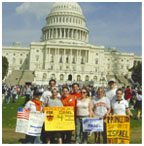 Jewish
opinions differ on campus
Jewish
opinions differ on campus
Photo: A group of 21 Princeton students attended the Israel Solidarity Rally in Washington, D.C., on April 15. (Yuval Eisenberg)
Jewish students differ in response to Mideast conflictOn April 18, the
Princeton Israel Public Affairs Committee (PIPAC) rallied in support of
Israel in response to a rally by the Princeton Divestment Campaign, an
organization that calls for Princeton to divest from its interests in
Israel. According to Dan Fishman ’04, an officer of PIPAC, many students
on campus were frustrated by the divestment campaign, and wanted to see
a concrete Jewish opposition.
"We held the counter-rally because we felt that the pro Israeli students
on campus needed to see that something was being done about the campaign,"
Fishman said.
Princeton students had also rallied for Israel on April 15, when a group
of 21 made its way to Washington ,D.C., to participate in the Israel Solidarity
Rally, which was attended by more than 100,000 Tovah Rosen ’02, an
orthodox Jew who adamantly supports Israel, organized the Princeton group
and said she was pleasantly surprised by the responses she received from
the more secular Jews on campus.
"Most people saw it as a nonpolitical message," she said. "Just,
we support Israel’s right to exist."
Although most Jewish students on campus do support Israel’s right
to exist and strongly oppose the Palestinian suicide bombings, there are
many different views about how the Israeli-Palestinian conflict should
be resolved.
Rosen, who grew up in Flatbush, Brooklyn, a community where she claims
everyone espoused similar beliefs about Israel’s biblical claim to
the occupied territories, says that among Jewish students at Princeton,
"there are people of varying viewpoints."
Elliot Ratzman GS represents one of these different views. Ratzman sees
himself as a mediator between right wing Israeli groups and Palestinian
groups, and supports Israel’s right to exist but not all of its actions.
In articles earlier this year for the American Foreign Policy magazine,
a student publication, Ratzman criticized Israel’s occupation of
the West Bank and Gaza, and openly supported some of the ideas of the
Princeton Divestment Campaign. But as someone who lived in Israel for
two years, Ratzman could not join the divestment movement himself. "I
feel like somebody should be calling for divestment, but not me,"
Ratzman said. "As someone dedicated to humanist principles and as
a patriotic Zionist, I feel it is my duty to be critical of Israel."
Yoav DiCapua GS and Guy Geltner GS are also critical of Israel. As "refuseniks,"
Israeli soldiers who refuse to serve in the occupied territories of Israel,
DiCapua and Geltner are two of almost 500 Israeli soldiers to sign a petition
stating their opposition to the Israeli occupation. These "refuseniks"
claim that the occupation corrupts the Israeli system and has made Israel
more racist and more aggressive.
"We suggest that American Jews ask themselves what kind of an Israeli
state they see in 50 years," DiCapua said. "Do they want a chauvinist
autocracy or a democratic Jewish state living in peace with its neighbors?"
Most Jewish students fall somewhere on the spectrum between Rosen and
the "refuseniks," and the April 18 rally by PIPAC moved 100
of these Jews to action. PIPAC is dedicated to encouraging dialogue about
the issues facing the state of Israel and its relationship with the rest
of the world. Although PIPAC is not an exclusively Jewish organization,
Fishman estimates that its membership includes a majority of practicing
Jews on campus.
"I think that most of the Jews on campus who have an opinion on the
subject support Israel," Fishman said. "But I think that every
member differs slightly in his or her views on the Arab-Israeli conflict
in general." ![]()
By Melissa Harvis Renny ’03

 James Baker
’52 has donated his papers to Princeton. A top-level official in
the administrations of three U.S. presidents, Baker was also America’s
chief diplomat at the end of the Cold War and witnessed the collapse of
Communism. (Photo
by Denise Applewhite)
James Baker
’52 has donated his papers to Princeton. A top-level official in
the administrations of three U.S. presidents, Baker was also America’s
chief diplomat at the end of the Cold War and witnessed the collapse of
Communism. (Photo
by Denise Applewhite)
The national press reported at the beginning of June that Henry Louis Gates, director of the W. E. B. DuBois Institute for Afro-American Research, has decided to remain at Harvard in order to rebuild its program after losing two prominent scholars to Princeton this year. It had been speculated that Gates would relocate to Princeton, where he has a standing offer, said the Associated Press.
The university has published a book about its Forrestal campus. Called Princeton’s James Forrestal Campus: Fifty Years of Sponsored Research, the book was written by J. I. Merritt ’66 and chronicles the history of the facility that was begun in 1951 under the aegis of President Goheen. The campus is home to research endeavors in fusion, atmospherics, and gas dynamics.
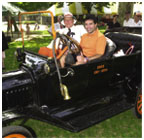 At Reunions
the Class of 1950 handed off its Model
T to the Class of 1982. Hank Rentschler ’50, left, poses with
Tony Santullo ’82. The car was bought by William Spencer ’15
for his class’s 20th reunion. It was later passed to the Class of
1950. (Photo by Frank
Wojciechoski)
At Reunions
the Class of 1950 handed off its Model
T to the Class of 1982. Hank Rentschler ’50, left, poses with
Tony Santullo ’82. The car was bought by William Spencer ’15
for his class’s 20th reunion. It was later passed to the Class of
1950. (Photo by Frank
Wojciechoski) ![]()
